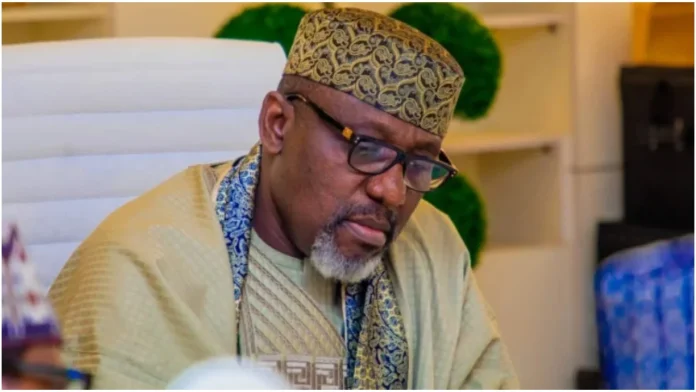The former Imo State Governor, Rochas Okorocha, has been freed from corruption allegations filed against him by the Economic and Financial Crimes Commission (EFCC).
The order was given on Friday by Justice Yusuf Halilu of the High Court of the Federal Capital Territory (FCT).
The decision of the Abuja court makes it the third time a competent court discharged the former lawmaker of fraud and corruption allegations levelled against him by the anti-graft agency.
EFCC told the courts that the offences were committed while he was the governor of Imo State between 2011 and 2019.
However, the judge ruled that the case is an abuse of court processes.
According to the court, it was wrong for EFCC to continue to file similar charges against a defendant in different courts, particularly when a court of competent jurisdiction had already decided on the matter.
Earlier, Justice Stephen Pam of the Federal High Court in Port Harcourt had in a 2021 judgment, freed the former Imo governor, declaring the charge as illegal, unlawful, null and void the investigation upon which it was based on.
Furthermore, Justice Pam ordered the EFCC to drop its prosecution of Okorocha concerning the investigation.
In May 24, 2022, EFCC, however, laid a six hour siege at the residence of Okorocha, after ehich they broke into his house and whisked him away.
READ ALSO: Robbery: Osun Varsity Suspends 100-Level Student
He was subsequently arraigned before the Federal High Court in Abuja alongside six others.
They were alleged to have embezzled the sum of N2.9 billion belonging to the Government of Imo State.
However, Justice Inyang Ekwo, in a ruling delivered on February 6, struck out the charges for contravening Section 105 (3) of the Administration of Criminal Justice Act (ACJA), 2015, which gives the Attorney-General of the Federation the power to recall a case.
Justice Ekwo held that the directive of the AGF in a letter dated September 12, 2022, to EFCC to forward the case file with its comments on the issues for consideration and review was binding on the commission.
The court agreed with Okorocha that the earlier judgement of a court of coordinate jurisdiction sitting in Port Harcourt in suit number FHC/PH/FHR/165 between him and EFCC restraining the agency from further proceeding on the alleged offence subsists.
Dissatisfied, the commission approached the High Court of the FCT and filed another set of charges against the former governor.
But Okorocha, through his lawyer, Chief Ola Olanipekun, SAN, challenged the competency of the charge in an application, claiming it was an abuse of court processes.
Delivering a ruling in the application on Friday, Justice Halilu held that it was wrong for the EFCC to bring a suit that has already been decided by a court of coordinate jurisdiction, especially when there was an order of court restraining the anti-graft agency from prosecuting Okorocha over the outcome of an investigation that has been nullified by the court.
The judge noted that there is nothing more than court abuse in the action of the commission by going ahead and filing the same suit in three different courts.
Justice Halilu, while noting that the agency by law is conferred with a wide range of investigatory and prosecutorial powers, maintained that the commission must learn to operate within the law, adding that the EFCC, being a creation of the law, must be a respecter of the law.
The court noted that the evidence before it showed that a Federal High Court had in 2021 freed Okorocha from fraud and corruption charges brought against him by the EFCC.
He noted that while the commission did the right thing by appealing the judgement, it ought not to have approached another court of coordinate jurisdiction to file a similar charge against Okorocha.
While warning that nobody or agency is above the law, the court advised the anti-graft agency to accept that there must be an end to litigation.
“Once a case of abuse of court processes is established, the best thing to do is to dismiss the charge; the first defendant is hereby discharged,” the court held.

